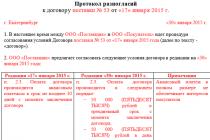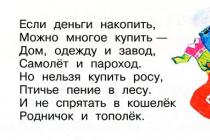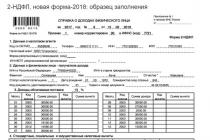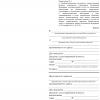We posted the text of the letter to the bank and the prosecutor's office in case the bank starts to abuse 115-FZ.
I had to face an absurd situation, not the first time. As part of the image of violent “anti-money laundering” activities, Sberbank, under the guise of 115-FZ, managed to block not only the IP account, but also the director’s personal account as an individual opened in the same bank.
In this case, both accounts were blocked without explanation, with a verbal explanation "on suspicion of violation by an individual entrepreneur of 115-FZ and the possible doubtfulness of the transaction".
The client made a formidable "cart" to the bank, with a copy to the prosecutor's office. On personal experience it has been verified that the bank moves better when they start to slow it down “from above”.
The text was this:
« Sberbank violated the following provisions of the law:
1. Provisions of the article 858 of the Civil Code of the Russian Federation— “restriction of the client’s rights to dispose of the funds on the account is not allowed, with the exception of the seizure of cash on the account, or suspension of operations on the account in cases statutory » - without a court decision and in the absence of enforcement proceedings against me;
2. In this case, the Bank limited my right to dispose of my own funds through the remote banking service, despite the fact that from my accounts monthly, in full (according to the Bank's tariffs) and without acceptance, remuneration is paid to the Bank for servicing a current account using Internet technologies. The Bank unlawfully refused me to carry out operations on the above my accounts using the remote banking system. The bank did not unlawfully recalculate the fee for this service (Article 158 of the Criminal Code of the Russian Federation- theft).
3. Violation of provisions paragraph 2 of article 845 Civil Code RF— “the right guaranteed to the Client by law to freely dispose of the funds available on the Client’s account”;
4. Violation paragraph 2 of Federal Law No. 115-FZ dated 17.08.2001 (with amendments and additions) - “transactions with funds ... are subject to mandatory control if (in relation to the counterparty) there is information received in accordance with the procedure established by law about their involvement in extremist activities or terrorism”. In relation to me, given the provisions of the above law, there is no such information, in this regard, the bank does not have the right to limit my rights to dispose of my own money. Thus, there is slander against me - article 128.1. Russian Criminal Code;
5. Violation of provisions 115-FZ, providing only for “Refusal to perform dubious transactions” (clause 11, article 7 of this Law), and not limiting my rights to use accounts.
In addition, prior to the restriction of my rights to use the account (suspension of operations on accounts), the Bank did not ask me for any documents on ongoing transactions. this account operations.
Thus, there is also Article 10 of the Civil Code of the Russian Federation- "abuse of the right", article 285 of the Criminal Code of the Russian Federation- "abuse of official powers" and article 330 of the Criminal Code of the Russian Federation"arbitrariness" - unauthorized, contrary to the procedure established by law or other regulatory legal act, the commission of any actions, the legality of which is disputed by an organization or a citizen, if such actions caused significant harm.
6. Thus, without asking me for any documents confirming transactions on accounts, the bank unlawfully classified all transactions on my accounts as doubtful;
7. Violation by the Bank of the provisions of the Central Bank of the Russian Federation — « banking rules cannot contain provisions that contradict the legislation of the Russian Federation”(Instruction of the Central Bank of the Russian Federation No. 28-i dated September 14, 2006, as amended by Instructions of the Bank of Russia dated November 25, 2009 No. 2342-U, dated August 28, 2012 No. 2868-U, etc.);
8. Violation by the Bank of the Regulations Article 16 of the Law of the Russian Federation On the Protection of Consumer Rights(and IP is not legal entity and applies to consumers) No. 2300-01 of 02/07/1992(with amendments and additions, in particular, as amended on 07/03/2016) - “the terms of the contract that infringe on the rights of the consumer in comparison with the rules established laws or other legal acts Russian Federation in the field of consumer protection are recognized as invalid”;
9. Considering that, according to the Bank's tariffs, for transactions carried out using "paper technology" the amount of the fee is significantly higher than the fee for transactions carried out using Internet technologies, there is a deliberate restriction by the Bank of my rights - Article 163 of the Criminal Code of the Russian Federation (extortion).
Given the above, I require:
1. Immediately investigate the legitimacy of the actions of the Bank's employees;
2. Within three days from the date of receipt of this appeal, remove all restrictions on my accounts;
3. Recalculate monthly and annual bank fees and provide me with a detailed calculation.
Otherwise, this question will be decided by the courts."
I immediately warn you: the solution to this problem is rarely quick, but it must be solved, otherwise the blocking can drag on indefinitely, provoking questions from comrades from financial monitoring and more responsible organizations.
The system of Sberbank, like any other bank in Russia, analyzes Money transfers customers by checking for suspicious transactions (Federal Law No. 115). That is, all operations non-cash transfers with further cashing out of funds that may turn out to be illegal are necessarily monitored. As a result, Sberbank blocks cards individuals for making illegal transfers, as well as other accounts related, for example, to extremist and other types of prohibited activities.
In 2019, the Federal Financial Monitoring Service puts violators on a special list. Work with individuals included in this list, banking organizations forbidden. At the same time, the base of illegal clients continues to expand.
Having discovered suspicious transactions, Sberbank usually chooses one of the following actions:
- customer cards are blocked;
- the bank imposes a ban on the debit account, as well as on the issue/reissue of a blocked card;
- refuses to transfer funds and issue cash;
- closes access to the Sberbank Online application.
For example, if money was transferred to the client’s card for the sale of a car or returned large debt, the card may already be blocked. In order to get access to the funds again, it is necessary to prove, based on official documents, that the money was obtained legally.
The bank can notify the client in advance by sending an SMS, an email or a phone call from an employee - the user is informed about possible blocking. At the same time, he is often asked for papers and information that speaks in favor of the legality of the origin of funds. These messages indicate the terms for consideration of papers, as well as when the card will be unblocked and mobile bank operations. There is an opinion that if it is not possible to confirm the transparency of the transfer, then the amount burns out. These processes are supposedly carried out according to the standard algorithm by the bank's robots.
As the press service of Sberbank explained, “funds cannot burn out, as this contradicts the basics of banking. Sberbank blocks dubious transfers only for remote access, but not the account itself. If the transaction is denied twice, the client is invited to terminate the contract. In this case, funds can be transferred to the user's personal account in another bank.
New technologies for analysis
Previously, screening out violators was not automatic: transaction processing and decision-making on blocking fell on the shoulders of the operator. Although the requirements for why to block the transfer were simpler, because the verification of all transactions human resources not enough. Now it has become possible to analyze millions of operations according to the scheme of intellectual selection, with the help of specialized computer programs.
According to representatives of Sberbank, the system has been installed, is working effectively, and will not slow down. The analyzer studies the client's income, partners with whom mutual settlements were most often made, and other relevant information, and only after that Sberbank can block a suspicious card. At the same time, according to statistics, the error of such systems is only 10%.

How to avoid blocking
Consider three common reasons why Sberbank blocks individuals' cards.
- Counteraction to money laundering and sponsoring of terrorism (banks, as a rule, pay attention to transactions in the amount of more than 600 thousand rubles). Here it is better not to contact dubious sources, for example, in the form of anonymous wallets, since Sberbank can block the card on suspicion of fraud and various frauds.
- The card is blocked for the safety of the client. Access requests from abroad or, conversely, payment for services can lead to blocking money on a Sberbank card foreign company. In the first case, you need to warn the bank in advance about going abroad, in the second case, call and confirm the transaction.
- Control of undeclared income. At the request of the bank, it is necessary to provide documentary evidence of the source of funds. Inquiries are considered 2-5 days. A negative decision is possible if the securities do not fully justify the economic meaning of the operation.
If Required documents were sent, but Sberbank did not approve them, then nothing can be done within the framework of this institution. You can only try to issue a card again after a while; the bank sometimes reconsiders its decision.
In 2015, 56 million rubles were received on the Sberbank client card. The user tried to cash them out the next day. The company regarded the operation as a possible fraud and demanded supporting papers. Having studied them, the employees blocked the Sberbank card. Then the owner of the money redirected them to term deposits, but, for the transfer of money, the bank again refused to withdraw funds. After that, the user went to court, but the courts of all instances were on the side of Sberbank. In this case, the user needed to refute the dubious origin of the money, but the documents presented were not enough. Money could also be transferred to a third-party bank account.
Preparation of documents
There is no exact list of documents here. The main thing is that in a particular case, the papers confirm the legality of the extraction of funds and the financial meaning of the operations. These can be invoices for the purchase of services and goods, pay slips about wages, IOUs, contracts of sale, loan, lease, etc., certificates from tax service, billing statements from other banking institutions etc.
When requesting the necessary information, the bank indicates how to send it. The method of transmission and the address of the recipient are noted in the request. For example, the bank may ask you to send scanned copies of papers to e-mail, send copies by regular mail or bring them to the place where the cards are issued.
To send by mail, it is better to choose the PDF format, while it is considered that the file size should not exceed 12 MB. If it is larger, then you can send several letters. It is recommended to use regular mail only as a last resort, as the letter may not arrive on time. If necessary documents No, you should notify the bank about it in the way suggested in the request.
Thus, transferring money from card to card for apartment renovation or other services becomes irrelevant. All transfers are monitored, and you have to answer for illegal actions. It is also not recommended to withdraw large amounts if there is no documentary evidence of the legality of their receipt.
Articles that appeared on the Internet that Sberbank was massively blocking cards of individuals in 2019 stirred up public unrest and gave rise to many questions. This is not surprising, because Sberbank remains one of the most famous and reliable banks, whose services are used by a significant part of Russians.
Does Sberbank really block cards?
The first rumors about blocking cards appeared in November last year. Articles appeared on the network with stories about the unreasonable suspension of bank card transactions. Witnesses appeared who claimed that the card could be blocked even due to the fact that its owner transferred funds to another individual in the amount of a little more than 1000 Russian rubles. Allegedly, justification is required for such operations.
Then, unconfirmed information was added to this that a law had been signed, according to which all, even insignificant in amount, money transfers would be taxed, which further increased public tension. People suggested that all transactions carried out through Sberbank Online would have to be substantiated by documents. Otherwise, according to rumors, the card may be blocked for transferring money, and its owner will face many difficulties: from unlocking it to cash spending and problems with the bank itself or the tax authorities.
In the wake of the discussions, Sberbank hurried to make an official statement and refute these rumors, emphasizing the lack of personal control over the transfers of individuals to each other, which, however, did not greatly reduce public concerns. However, if we take a closer look at all the references to blocking bank cards on the network, it turns out that Sberbank acted for one of three reasons.
Ensuring the security of the cardholder
The bank blocks the card if a non-standard operation is performed on it and there are suspicions that the account information has fallen into the hands of intruders.
- The owner previously withdraws cash two to three times a month in the amount of 5,000 to 10,000. If a withdrawal was recorded in one day in the top ten different bank omats in small amounts, the bank may block transactions.
- The owner has always operated in Kaliningrad. If the withdrawal request comes from Kazakhstan, the bank may stop the movement on the account until confirmation is received from the cardholder.
Counteracting the receipt of illegal income
The bank blocks the card and requires an explanation if there is a suspicion that the owner is receiving illegal income.
Example: if numerous transfers of small amounts are recorded from many individuals, constantly different, the bank may block the card and request additional information.
Countering money laundering and terrorist financing
The bank blocks the card if transactions on it violate the law No. 115-FZ "On counteracting the legalization (laundering) of proceeds from crime and the financing of terrorism" dated 08/07/2001.
All these reasons are quite reasonable, designed to protect the interests of the cardholder and comply with applicable law.
Blocking for transfers under 115-FZ
According to Law No. 115-FZ, a bank usually tracks transfers of more than 600,000 rubles. If he finds the transfers doubtful, the card is blocked until the details are clarified. Sberbank may also prevent a client from working through Internet banking, limit cash withdrawals and account openings.
Sberbank may have suspicions about an attempt to legalize illegal income in such situations:
- Serious amounts are systematically received on the card from third parties, and the owner quickly cashes them out or transfers them to third parties.
- In a short period, about 600,000 rubles are received from different senders, and the owner transfers them to an account in another bank, transfers them to foreign currency, stocks or bonds.
- The client makes several transfers in the amount of about 600,000 rubles to different recipients for the same product or service.
- Money often comes to the account from residents of Belize, Bahrain, China, the United Arab Emirates, the USA, Bermuda and a number of other countries.
- Systematically money is sent to residents of these countries.
- Money is regularly transferred to non-residents of the Russian Federation to accounts in non-resident banks of the country of the sender and recipient (for example, a transfer from a Russian to a German to an account in a Polish bank).
- Periodic transfer of money as an advance payment for goods without subsequent documentary confirmation of the transaction and its receipt.
Signs that give Sberbank a reason to block the card in connection with the likely financing of terrorist organizations:
- The client and the person included, according to Rosfinmonitoring, in the List of organizations and individuals whose property is subject to freezing in connection with the financing of terrorist organizations, have the same address.
- Selling or buying in in large numbers military uniforms, medicines, foodstuffs with a long shelf life, if the economic activity of the cardholder does not imply it.
- Sale or purchase of poisons, chemical reagents and bacteriological materials is carried out, if economic activity does not involve such operations.
- Receipt of money from non-residents of the Russian Federation to the accounts of non-profit resident organizations.
- Spending funds from the accounts of resident non-profit organizations to non-residents.
According to Law No. 115-FZ, the bank independently assesses the degree of doubtfulness of transactions and makes a decision to suspend servicing the card. If necessary, he asks the client for additional information. If the cardholder has provided convincing, documented explanations, the bank may cancel the blocking.
How to prevent blocking
Avoiding blocking operations is quite simple:
- do not give your card for use, even short-term, to relatives, friends and acquaintances;
- if you receive funds by bank transfer, it is better to reduce cash withdrawals and switch to an online settlement system;
- do not carry out transactions on your card that are not related to you, do not receive or withdraw money at the request of other persons, especially large amounts and on a regular basis;
- do not try to receive illegal income, formalize your income-generating activities in accordance with legislative norms;
- don't use your personal card to perform business transactions, even if you are registered as an individual entrepreneur, open additional card specifically for conducting business operations;
- do not formalize as a manager or individual entrepreneur nominally at the request of acquaintances or relatives, only if you really carry out their functions;
- organize the storage of supporting documents for all your transactions, including contracts, TTN and invoices;
- promptly and honestly answer bank employees about the purposes of your operations and sources of income if the bank has doubts about their legality;
- if necessary, provide all supporting documents requested by the bank on ongoing transactions within the specified period.
The easiest way to prevent blocking by Sberbank bank card– act according to the law, avoid dubious transfers and illegal income.
What to do if the card is blocked
If Sberbank suspects the account holder of illegal activities, it informs the client about blocking the card via SMS or email.
This message states:
- the fact of suspension of operations or disconnection from Sberbank Online;
- a list of documents to confirm the legitimacy of the transactions, the timing, method and address of their transfer;
- the fact of acceptance of the submitted documents for consideration, its terms;
- the decision made, the timing of the restoration of the card and online services, if the decision was positive.
Information to confirm the legitimacy of transactions is usually requested from electronic form as pdf-documents less than 12 MB in size. When sending, it is important to indicate your last name, first name and patronymic. Sometimes the bank requests the provision of information in paper form to the branch that opened the account or issued the bank card.
It is better to send documents as indicated in the SMS message. If this is not possible, you must immediately notify the bank about this, explaining the reasons. As justification, contracts for the purchase of goods, the provision of services, the receipt or provision of loans, pay slips from the place of work and any other documents clarifying the legality of the operations performed are provided.
After considering the explanatory information, Sberbank makes a final decision, which notifies the cardholder. If the decision is positive, access will be restored, if negative:
- the card remains blocked, money on it can be received within 35-45 days;
- you can receive money and pay payments only at a bank branch;
- translations large sums will be available only after review by the bank;
- the client will be denied access to Sberbank Online, opening new accounts and issuing new cards;
- other banks may also refuse to open accounts and service the client through Internet banking.
Several blockages in one year lead to the fact that the bank closes the account.
Sberbank bank card is reliable and convenient way calculations. Increasing control of banks over its use contributes to the security of the client. To ensure timely settlements and constant access to your money, it is enough not to violate the law and not to participate in dubious transactions.
Read also
Information exchange between central bank Russia and participants registered on the territory of the Russian Federation financial market. A new version personal account Central Bank and its possibilities. Advantages and disadvantages new version. Step-by-step algorithm for creating an account
After the anti-money laundering 115-FZ came into force, blocking company accounts and “black” lists of business is no longer surprising. largest bank country "Sberbank" on its official website posted a small educational program and explained what is "good" and what is "bad" in his opinion. If your bank account was blocked, then maybe for one of the reasons listed.
“It is important for us that cooperation with clients is successful and fruitful. That is why we have prepared several recommendations, following which will allow you to work calmly and avoid blocking your current account, and for us to create the most comfortable conditions for your service at the bank,” they write on the official website of the organization.
Right actions and tools
1. Connect a salary project and pay salaries to bank cards
2. Issue business cards for yourself and your employees - this way it will be more convenient for you to pay the expenses of the organization
3. Get cash from your bank account and be sure to indicate the purpose for which you are withdrawing money
4. Funds for the founders of the company withdraw through the payment of dividends
5. Pay taxes at least 0.9% of the turnover on your account
6. Pay expenses with a business card or invoice, rarely withdraw cash
7. Fill out payment details in detail
8. Work according to the selected OKVED codes and inform the bank in a timely manner if they change
9. Inform the bank about all changes in your company (change of CEO, address, etc.)
10. To check new partners, use the Counterparty Check Service or other open sources
11. Timely provide information and documents at the request of the bank - within 7 working days
12. Reflect in your payments economic activity organizations (rental, etc.)
Wrong actions
Surprisingly, there were even more of them than the right ones.
1. Regular issuance of large amounts from the current account for other purposes
2. One-time withdrawal of a large amount that has just been credited to the current account
3. Repeating transactions of the same type for the withdrawal of large amounts
4. Using a business card to withdraw cash
5. Operations of receipt and withdrawal of cash, carried out on the same day
6. Withdrawals for other purposes that are disproportionate to the conduct of business
7. Operations that do not make economic sense (example: paying a six-figure salary in a company with zero accounting records)
8. Numerous deposits opened for short periods (up to a month), which the client closes, withdraws money in cash
9. Transfers made without apparent reason to the accounts of another bank where worst conditions (low rates on deposits, high commissions etc.)
10. Operations for which it is impossible to establish the parties to the transaction
The Bank specifically notes that your actions attract attention if:
11. Do not pay taxes in our bank (maybe pay from an account in another bank, but we do not know about it)
12. Indicate incomplete, incorrect data in the purpose of payments
13. Make payments that do not match the selected activities
14. Interact with dubious counterparties whose activities are not transparent to the bank and which may affect your reputation
15. Accept payments for services and goods with the allocated amount of VAT to the current account, and make outgoing payments without VAT, or their volume is not comparable
16. Ignoring bank questions, answering late
This list ends with the phrase "Make your business more transparent." But for me personally, there were some points that puzzled me. For example, what is illegal about paying taxes from other bank accounts or transferring money to the accounts of banks with “worse conditions”?
For those in the tank...
Effective September 1, 2016 new edition"anti-money laundering" Federal Law No. 115-FZ. The law was passed with the best of intentions, but everything turned out as always. The law required banks and others financial institutions analyze monetary transactions their customers and make sure that there is nothing bad. In this job commercial banks use the instructions of the Central Bank, which lists the signs of suspicious transactions. You can familiarize yourself with them.
If the transaction falls under at least one sign, then it is blocked, and the company is blacklisted. If a company is included in this list, then, in fact, business in the future can be put an end to. Even a single failure deprives the client of access to banking services and multiplies subsequent locks.
The recommendations, as the names suggest, were “recommendatory” in nature. However, banks began to execute everyone indiscriminately, fearing sanctions against them from the Central Bank. The current practice of using 115 Federal Laws in the activities of banks and regulations The Bank of Russia on this topic implies a serious responsibility of banks and their employees to comply with the law. This leads to a conflict of interest - if the decision is justified and made on the basis of the right criteria, then the bank is right. If the bank's decision is wrong, then the Central Bank's sanctions await it and we return to the previous level. In 2017, 700 thousand accounts were blocked. Under mass blocking, both the accounts of companies and individual entrepreneurs, and individuals.
Friends, welcome! I'll start without further ado: my partners are increasingly reporting that Sberbank is blocking accounts, cards, and online banking, often without the ability to restore them. If you are working with investment projects, cryptocurrency exchanges or exchangers, and are also just used to saving their nerves, I recommend cutting your Sberbank cards and moving to another bank. All details below.
What's up, Scrooge?
Around the end of September-beginning of October, Sberbank had an aggravation, and he began to furiously perform " the federal law on combating the legalization (laundering) of proceeds from crime and the financing of terrorism” dated 07.08.2001 No. 115-FZ.
According to it, the bank can block your account, card and online banking without warning if it seems to them that you are behaving suspiciously, for example:
- money from legal entities comes to your card for no reason at all;
- money suddenly came to your card from a counterparty with signs of a transit one;
- you receive money/transfer to individuals too often;
- you regularly replenish your account with a large amount;
- and regularly withdraw funds from the card.
However, most often the account is still blocked with a warning - they call, ask to explain what, to whom and why they transferred, ask about sources of income and explain what is happening with concern for the safety of money.
However, if something goes wrong, you will need documents confirming the legitimacy of the transaction and its expediency, as well as proof of income to unlock.
What is FZ-No. 115?
The notorious Federal Law No. 115, which combats the financing of terrorism and money laundering, has been in force since 2001 and until 2016 there were no special moves in it. As Nikolai Timofeev, Deputy Director of Risk Management at Tochka Bank, said in an interview, the current turmoil is due to the fact that the Central Bank has tightened regulation of the banking sector, and Elvira Nabiullina has threatened to make everyone atata.














